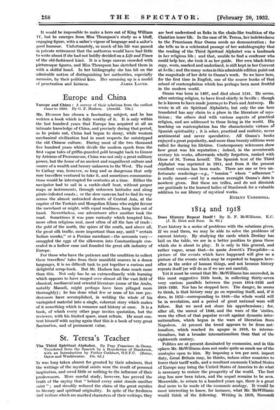Europe and China
Europe and China : A survey of their relations from the earliest times to 1800.- By D. F. Hudson. (Arnold. lie.)
MR. HUDSON has chosen a fascinating subject, and be has written a book which is fully worthy of it. It is only within the last hundred years that Europe has acquired at all an intimate knowledge of China, and precisely during that period, as he points out, China had begun to decay, while western mechanical civilization had in most respects far outstripped the old Chinese culture. During most of the two thousand five hundred years which divide the modern epoch from the first vague tales of griffin-guarded gold brought back to Greece by Aristeas of Proconnesus, China was not only a great military power, but the home of an ancient and magnificent culture and source of a wealth and luxury unknown to the West. The road to Cathay was, however, so long and so dangerous that only rare travellers ventured to take it, and sometimes communica- tions would be interrupted for centuries at a time. Either the navigator had to sail in a cockle-shell boat, without proper snaps or instruments, through unknown latitudes and along pirate-infested coasts ; or the slow caravan had to find its way across the almost untracked deserts of Central Asia, at the caprice of the Turkish and Mongolian Khans who might favour the merchant or might, with equal readiness, hang him out of hand. Nevertheless, one adventurer after another took the road. Sometimes it was pure curiosity which tempted him, more often religious zeal, most often of all the lure of trade : the gold of the north, the spices of the south, and above all, the great silk traffic, more important than any, until " certain Indian monks," or a Persian merchant—the accounts vary— smuggled the eggs of the silkworm into Constantinople con- cealed in a hollow cane and founded the great silk industry of Europe.
For those who have the patience and the erudition to collect these travellers' tales from their manifold sources in a dozen languages, it is no difficult task to put together a curious and delightful scrap-book. But Mr. Hudson has done much more than this. Not only has he an extraordinarily wide learning which appears to have ranged over almost all the vast field of classical, mediaeval and oriental literature (some of the Arabs, notably Masudi, might perhaps have been pillaged more thoroughly) ; he has done what few or none of his rare pre- decessors have accomplished, in welding the whole of his variegated material into a single, coherent story which makes of it something which is romance and history at once. It is a book, of which every other page invites quotation, but the reviewer, with his limited space, must refrain. He must con- tent himself with saying again that this is a book of very great fascination, and of permanent value.






































 Previous page
Previous page